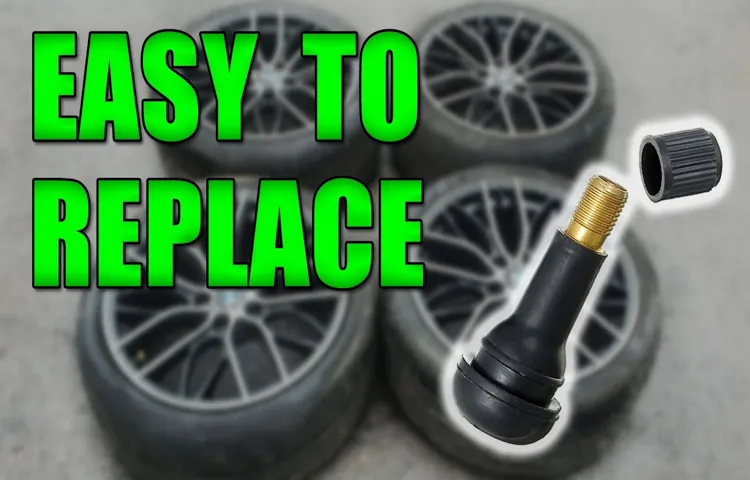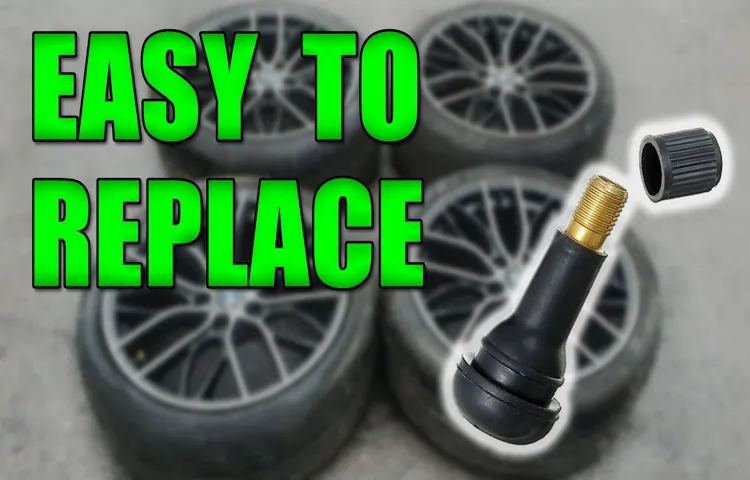Have you ever had to replace a tire valve and wondered how much it would cost? It’s important to keep your tires in good condition, and maintaining the air pressure is a crucial part of that. The valve is the small component attached to the wheel rim that allows you to inflate and deflate your tires. Over time, valves can become worn or damaged, causing air leaks and other issues.
But what is the typical cost of tire valve replacement, and is it worth the investment? In this blog post, we’ll explore the factors that affect tire valve replacement cost and provide some tips for saving money on this important car maintenance task.
Table of Contents
Understanding Tire Valves
If you’ve ever had to replace a tire or just had one repaired, you may have noticed the mechanic checking or replacing the valve stem. Tire valves are small but very important components of your tires, as they provide the necessary seal to keep air inside and maintain tire pressure. Depending on the type of valve stem, a replacement can cost anywhere from a few dollars to over $100.
A typical rubber valve stem will typically cost under $5, while a high-performance metal valve stem can cost up to $50 or more. Other factors that can affect the cost include whether the valve is part of a larger TPMS system, the make and model of your vehicle, and labor costs. While it may seem like a small expense, keeping your tire valves in good working condition is essential for maintaining your car’s safety and performance.
So, if you suspect a leak or need a replacement, don’t put it off – it’s a small investment that can go a long way in preventing bigger problems down the road.
Types of Tire Valves
Tire valves are a vital component of your vehicle’s tires, as they are responsible for maintaining proper air pressure and ensuring a smooth ride. Understanding the different types of tire valves can save you time and hassle in the long run. The two most common types of valve stems are the Schrader valve and the Presta valve.
The Schrader valve is the more widely used of the two and can be found on most passenger vehicles. It is a reliable valve that is easy to inflate and deflate with a standard air pump. The Presta valve is typically found on high-performance bicycles and sports vehicles.
It is a slimmer valve that requires a specific pump head for inflation. It has a lock nut that provides extra security against air leaks. Understanding the type of tire valve that your vehicle has is crucial for proper maintenance.
Properly inflated tires can help extend the lifespan of your tires and efficiently reduce fuel consumption and your carbon footprint.

Why Replace Tire Valves?
Tire valves may seem like a small part of your car’s maintenance, but they play a crucial role in keeping your tires inflated and safe to drive on. Over time, tire valves can wear out, become corroded, or start leaking air. It’s important to replace them when needed to ensure optimal performance and longevity of your tires.
Additionally, there are different types of tire valves, including tubeless, tube-type, and high-pressure valves, so it’s important to know which type your vehicle requires. By understanding tire valves and keeping them properly maintained, you can avoid potential safety hazards on the road and extend the lifespan of your tires. Don’t neglect this small but important detail of your vehicle’s maintenance!
Factors Affecting Tire Valve Replacement Cost
If you’re wondering how much a tire valve replacement costs, there are a few factors that can affect the price. The type of valve and the make and model of your vehicle can play a role in the cost. Some valves may be more expensive than others, and certain vehicles may require more labor to replace the valve.
Additionally, the condition of the valve stem and any damage to the tire itself may impact the cost. It’s also important to consider where you’re having the valve replaced – prices may vary between mechanic shops and tire service centers. Overall, the cost of a tire valve replacement can range anywhere from $20 to $200 or more, depending on the various factors involved.
Type of Valve
The type of valve used in tire replacement can have a significant impact on the cost of the replacement. Different valves have different features and functions, which can affect their durability, ease of use, and compatibility with different types of tires. For example, rubber valves are generally cheaper than metal valves, but they may not be as durable and may need to be replaced more frequently.
Meanwhile, metal valves may be more expensive initially but can last longer and be more resistant to the elements. Additionally, the valve’s size and shape can also affect its cost, as some valves may require a special tool or installation process. Ultimately, the best valve for your tire replacement will depend on your specific needs and budget.
Be sure to consult with a professional to determine which type of valve is right for your tires and budget.
Type of Tire
When it comes to the cost of tire valve replacement, the type of tire you have is a major factor. The valve stem is the portion of the tire where the valve is inserted to inflate or deflate the tire. The type of valve stem you have will impact the cost of replacement.
Some common valve stem types are the standard rubber snap-in stem, high-pressure snap-in stem, and the metal clamp-in stem. The cost of replacing a standard snap-in stem is typically lower than a clamp-in stem, which is more durable and designed for high-performance tires. Additionally, the size and brand of the tire will also play a role in the overall cost of valve stem replacement.
It’s important to choose a valve stem that matches the size and type of your tire for optimal performance and safety. Keep in mind that proper maintenance and regular inspections can help prolong the life of your valve stems and ultimately save you money in the long run.
Labor Costs
Tire valve replacement cost depends on several factors that include labor costs. Labor costs can vary depending on the mechanic’s skill level and experience, as well as the location of the repair shop. In general, labor costs make up a significant portion of the overall cost of tire valve replacement.
In addition to the mechanic’s labor costs, the time required to complete the repair can also affect the overall cost. Some tire valve replacements may be more difficult and time-consuming than others, which can drive up the labor costs. To ensure that you get the best value for your money, it’s essential to choose a reputable mechanic who can offer a fair price for their services.
Remember, just because a mechanic charges more does not necessarily mean they are providing higher quality work.
Average Tire Valve Replacement Costs
If you’re wondering how much a tire valve replacement costs, the answer is that it varies depending on several factors. Generally, the cost can range from $5 to $30 per valve, but this doesn’t include the labor fees that come with having it installed. The valve itself may cost cheap, but if you need to replace all four valves, the cost can really add up.
It’s worth noting that if you’re experiencing slow tire leaks or uneven tire pressure, replacing the valve may not always be necessary – sometimes patching or resealing the valve stem can be a more affordable solution. If you’re unsure about the state of your tire valves, take your vehicle to a trusted mechanic or tire service center for an inspection. They can recommend the best course of action for your specific situation and provide you with a more accurate cost estimate.
Standard Tubeless Valve
If you own a tubeless tire car, then you are aware of the importance of the valve. A standard tubeless valve is what keeps the air inside your tires and ensures that your tires stay inflated. However, these valves are not invincible, and they wear out over time.
If you notice a slow leak in your tire, it is probably a sign that your valve needs replacing. The average cost of a tire valve replacement can vary depending on your car’s make and model. Typically it can range from $25 to $50 per tire, depending on the type of valve required.
It is essential to get your tires checked regularly and replace the valves when required, as neglecting to do so can affect your car’s performance and safety. Make sure to ask your mechanic about the type of valve your car needs and the cost before you have it replaced.
TPMS Valve
If you’re experiencing issues with your TPMS valve, it’s important to get it replaced as soon as possible to avoid further problems with your tires. On average, a tire valve replacement can cost anywhere from $20 to $200 depending on the type of valve needed and whether it needs to be replaced in all four tires. While it may seem like a small expense, replacing a valve can ensure that your tires last longer and operate efficiently.
Additionally, leaving a faulty valve unchecked can lead to more significant issues down the line, such as poor fuel economy, decreased handling, or even a blowout while driving. Overall, it’s important to prioritize regular tire maintenance and address any issues promptly to keep your vehicle running smoothly and safely on the road.
Presta Valve
If you’re a cyclist, then you know the importance of maintaining your bike’s tires. One common problem that you may encounter is a damaged or worn out Presta valve. A Presta valve is a type of tire valve that is often used in high-performance bikes because of its ability to hold higher pressures than other types of valves.
But, like any other part of your bike, Presta valves can wear out or get damaged over time. The average cost of replacing a Presta valve is around $10-$20, which can be a bit expensive for some cyclists. However, it’s important to keep in mind that regular maintenance can help prevent costly replacements.
Additionally, it’s possible to replace the Presta valve yourself with some basic tools and knowledge. If you’re unsure about how to do it, consulting a professional or watching a tutorial online can be helpful. Ultimately, it’s important to prioritize the health and safety of yourself and your bike by regularly checking and maintaining your Presta valve.
Conclusion & Tips
In the grand scheme of things, a tire valve replacement may seem like a small and insignificant expense. However, it’s important to remember that the small parts make up the whole. Just like a missing puzzle piece can ruin the entire picture, a faulty valve can lead to dangerous tire blowouts.
So, while the cost may seem like a drop in the bucket, it’s a drop that’s worth it for the safety and longevity of your tires. Plus, replacing a valve is much cheaper than the potential cost of an accident caused by a faulty valve. So, to put it simply: a tire valve replacement may be small, but it’s mighty important.
“
FAQs
What is a tire valve replacement and why is it necessary?
A tire valve replacement involves removing the old valve and replacing it with a new one. It’s necessary because over time, tire valves can wear out or become damaged, causing air to leak out of the tire.
How much does a tire valve replacement typically cost?
The cost of a tire valve replacement can vary depending on the type of valve being replaced and the location where the service is performed. On average, you can expect to pay between $5 and $20 per valve.
Can I replace a tire valve myself or do I need to go to a professional?
While it is possible to replace a tire valve yourself, it’s generally recommended to have a professional perform the service to ensure it’s done correctly and safely.
How long does a tire valve replacement take?
The time it takes to replace a tire valve can vary depending on factors such as the type of valve being replaced and the experience of the technician. On average, it takes about 15-30 minutes.
What are some signs that I may need a tire valve replacement?
Signs that you may need a tire valve replacement include low tire pressure, a tire that won’t hold air, or air leaking from the valve stem.
Can a tire valve replacement prevent flat tires?
While a tire valve replacement won’t necessarily prevent flat tires, it can help ensure that your tires stay properly inflated, which can reduce the risk of a flat.
How often should I get my tire valves replaced?
There isn’t a set time frame for when tire valves need to be replaced, but it’s a good idea to have them inspected regularly and replaced as necessary to ensure they are in good condition and working properly.



